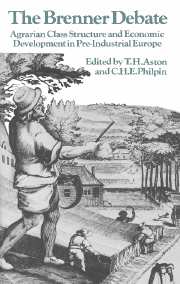Book contents
- Frontmatter
- Contents
- Preface
- Introduction
- 1 Agrarian Class Structure and Economic Development in Pre-Industrial Europe
- 2 Population and Class Relations in Feudal Society
- 3 Agrarian Class Structure and the Development of Capitalism: France and England Compared
- 4 Peasant Organization and Class Conflict in Eastern and Western Germany
- 5 A Reply to Robert Brenner
- 6 Against the Neo-Malthusian Orthodoxy
- 7 A Crisis of Feudalism
- 8 In Search of Agrarian Capitalism
- 9 Agrarian Class Structure and Economic Development in Pre-Industrial Bohemia
- 10 The Agrarian Roots of European Capitalism
- Index
- Past and Present Publications
2 - Population and Class Relations in Feudal Society
Published online by Cambridge University Press: 27 October 2009
- Frontmatter
- Contents
- Preface
- Introduction
- 1 Agrarian Class Structure and Economic Development in Pre-Industrial Europe
- 2 Population and Class Relations in Feudal Society
- 3 Agrarian Class Structure and the Development of Capitalism: France and England Compared
- 4 Peasant Organization and Class Conflict in Eastern and Western Germany
- 5 A Reply to Robert Brenner
- 6 Against the Neo-Malthusian Orthodoxy
- 7 A Crisis of Feudalism
- 8 In Search of Agrarian Capitalism
- 9 Agrarian Class Structure and Economic Development in Pre-Industrial Bohemia
- 10 The Agrarian Roots of European Capitalism
- Index
- Past and Present Publications
Summary
The essentials of Robert Brenner's argument have been put forward many times before by a long and distinguished line of proponents. The counter-argument is also securely placed in historiography. Consequently, there is much to be said for simply referring readers to previous publications. Yet Brenner's thesis warrants a comment, if only because it harbours a number of widespread misconceptions. In dealing with these misconceptions we will also take the opportunity of dissipating the doctrinal, or rather the nomenclatural, confusion which has for years befogged the controversies over the role of demographic factors in history. Lack of space and expertise has compelled us to restrict ourselves to western Europe, mainly England, in the middle ages. Brenner's notions of post-medieval developments in western Europe mainly attach to Le Roy Ladurie's writings, and had better be left to the latter's superior competence.
In his article Brenner sets himself a double task – to discredit the socalled “demographic” or “cyclical” Malthusian model, and to offer in its stead the class-oriented model. He makes the first of the two tasks far less arduous than it might otherwise have proved by misrepresenting the views of the historians he holds responsible for it. These misrepresentations are exemplified in his double accusation that the erring historians have assigned to demographic factors an all-determining role in the medieval economy and society and that, in so doing, they have disregarded or minimized the importance of social factors, above all the feudal class system and the exploitation of villeins inherent in it. Both imputations are groundless.
- Type
- Chapter
- Information
- The Brenner DebateAgrarian Class Structure and Economic Development in Pre-industrial Europe, pp. 64 - 78Publisher: Cambridge University PressPrint publication year: 1985
- 7
- Cited by

